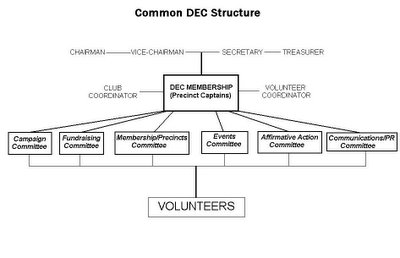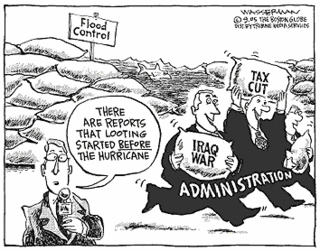So what does an ideal DEC look like. What kind of committees does it have? What kind of staff needs to be hired? What is the relationship between elected officers, paid staff, committees, and volunteers? How does it all flow? In this post, I will present three models for possible DEC organization. Keep in mind that DECs should always be constantly evolving, and should probably not EXACTLY look like one of the models. They are mere points of references for how DECs should grow, or downsize. I present three different models (for small, medium, and large-sized DECs) because DECs throughout Florida are very diverse, from the very small DECs in the small panhandle and North Florida counties, to the massive DECs of Miami-Dade, Broward, and Palm Beach Counties, and all the others inbetween. Each model is what I call a hybrid model which is a healthy cross between an all paid staff organization and an all volunteer based organization.
Refer back to my illustration of today's Common DEC Structure to visually see the differences in structure.
Small DECs (to 50,000 registered Democrats in the county)
The vast majority of small DECs are located in North Florida, where a lot of folks (though not all) don't exactly have deep pockets and work blue collar jobs for low pay. Dixiecrats (Democrats with conservative convictions who most often vote Republican) are the most numerous here. The number of loyal Democrats is often smaller than the raw registration number of the county, thus limiting DECs (where they exist, keep in mind many DECs in North Florida are MIA) resources and operational capabilities. Here's the ideal structure:
 As you will see in the rest of the models, the elected officers are retained. They are important because this allows the DEC membership (the precinct captains) to retain complete control over the organization, and that the overall idea of the DEC as a Democratic institution isn't undermined. I say this because there is a concern by some that by transitioning the DEC from an all volunteer organization to one that is increasingly reliant on the work of paid staffers, will undermine the DECs role as an important Democratic institution. This is the main way I keep checks and balances involved in the process.
As you will see in the rest of the models, the elected officers are retained. They are important because this allows the DEC membership (the precinct captains) to retain complete control over the organization, and that the overall idea of the DEC as a Democratic institution isn't undermined. I say this because there is a concern by some that by transitioning the DEC from an all volunteer organization to one that is increasingly reliant on the work of paid staffers, will undermine the DECs role as an important Democratic institution. This is the main way I keep checks and balances involved in the process.In this model, there are three paid staffers: a communications director, a finance and budget director, and a precincts director. You'll notice that each staffer "co-chairs" a committee with a volunteer chair. Here's what each staffer is responsible for:
Communications Director: The communications director is responsible for devising and carrying out public relations strategies. This involves the creation of an overall message and theme derived from a combination of forces (the Policy Committee, elected officials, word from the grassroots through the precinct captains, etc...) It then involves the distribution of press releases, planning and execution of press events, and the creation of talking points which can be quickly distributed to the party infrastructure throughout the county and to the state party if necessary. They co-chair the Events Committee.
Fundraising and Budget Director: The "F&B Director" is responsible for creating and maintaining a multitude of party fundraising campaigns, thus constantly raising money and finding new ways to raise it. They are also responsible for maintaining a state of fiscal responsibility within the party's budget. They draw up the budget, allocating funds to each committee and program. The budget should be approved by the DEC at large at a time worked about between the F&B Director and the party chair (should a budget be approved annually, quarterly, monthly?) They also work with the party chair and the chief of staff/executive director (seen in the next model) to determine staffers' salary. They co-chair the Fundraising Committee.
Precincts Director: The Precincts Director is responsible for recruiting, maintaining, and moving the arms of the party's vital precinct captain infrastructure. They work back and forth between the party's staff and precinct captains and make sure operational decisions made at the top, find their way to the party's grassroots and are actually enacted. They co-chair the Membership/Precincts Committee.
Also in this model there is one new committee, the Policy Committee
Policy Committee: Even though this is sometimes mandated by DEC bylaws, not all DECs have them. I will discuss the overall need for county parties across the nation to establish strong policy creation and analytical arms to create the fuel needed for candidates to round out their campaigns, give the local party focus, and give precinct captains, volunteers, and community activists something to shoot for. This committees focus is to do research on public policy issues and find solutions to public policy problems. They should publish regular reports on a wide variety of public policy issues. The committee should be a hybrid of community experts in various fields and volunteers and citizens with a desire to learn more and be active on a public policy issue or issues.
Medium DECs (50,000- 150,000 registered Democrats in the county)
 Chief of Staff/Executive Director: The Chief of Staff or the Executive Director (whichever you and your DEC prefers) is in charge of running the day-to-day party operations. The instant question is, "What about the chair, aren't they responsible for this?" Of course. As DECs evolve and grow, the chair is pulled in more and more directions. The chair has oversight over everything the Chief of Staff does, and actually should appoint the Chief of Staff and then the Chief of Staff should be approved by a majority vote in the DEC. The Chief of Staff is responsible for advising the chair in the hiring and firing process (the chair must approve all hirings and firings, as well as be approved by the DEC.) The Chief of Staff is additionally responsible for holding regular staff meetings (preferably daily) and coordinate the party's activities through the various staffers that work for the party. Plain and simple, they make sure things get done, and that the chair and thus the DEC is constanly informed. They co-chair the Camapaign Committee.
Chief of Staff/Executive Director: The Chief of Staff or the Executive Director (whichever you and your DEC prefers) is in charge of running the day-to-day party operations. The instant question is, "What about the chair, aren't they responsible for this?" Of course. As DECs evolve and grow, the chair is pulled in more and more directions. The chair has oversight over everything the Chief of Staff does, and actually should appoint the Chief of Staff and then the Chief of Staff should be approved by a majority vote in the DEC. The Chief of Staff is responsible for advising the chair in the hiring and firing process (the chair must approve all hirings and firings, as well as be approved by the DEC.) The Chief of Staff is additionally responsible for holding regular staff meetings (preferably daily) and coordinate the party's activities through the various staffers that work for the party. Plain and simple, they make sure things get done, and that the chair and thus the DEC is constanly informed. They co-chair the Camapaign Committee.Policy Director: The Policy Director is responsible for coordinating, drawing conclusions, and tying together various policy ideas put forward at all levels, from national think tanks, to scholarly and news articles, and to the ideas and proposals of the policy committee into clear policy positions for the local party to adopt. They co-chair the Policy Committee.
Club Coordinator: The Club Coordinator is responsible for working with the multitude of Democratic clubs throughout the county, making sure they're registered and in compliance with state party bylaws and state government regulations. They are also responsible for making sure clubs are informed of what the DEC is doing, and that clubs are involved in the process. The Club Coordinator is also constantly looking to start new clubs as well as maitain and offer organizational assistance to existing clubs.
Volunteer Coordinator: The Volunteer Coordinator is responsible for recruiting, maintaining an accurate list of, coordinating, and rewarding active volunteers. For all the operations the party and individual campaigns conduct, the volunteer coordinator should work with the appropriate staffer/committee/elected official to make sure the operation/event is properly staffed by volunteers. They should work heavily with the Precinct Director and the precinct captains.
...OK folks, I'm a little tired from typing all this. I'll start back tommorrow and finish up this post by discussing the ideal structure for large DECs (150,000 registered Democrats in the county or more.)








